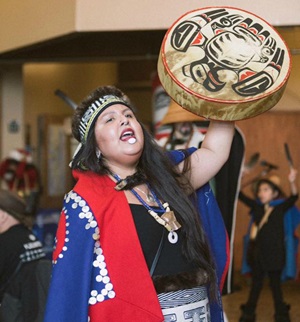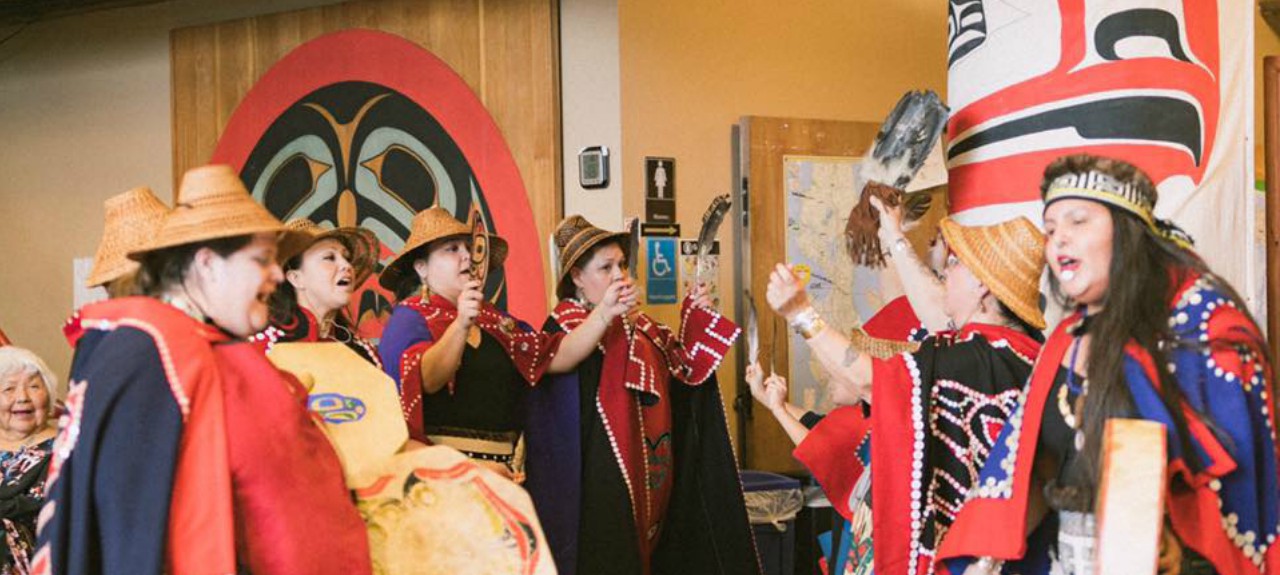Reclaiming Indigenous culture and language for youth.
By Aileen Balahadia, Neighbor to Neighbor Program Consultant, and Elaine Chu, Senior Philanthropic Advisor
It was a site visit like no other.
That was the thought running through the minds of Neighbor to Neighbor (N2N) advisory members who listened to Sondra Segundo, the founder of Haida Roots. She virtually shared the rich song, storytelling, and local art traditions of the Haida people. As Sondra told her story, those who heard it could immediately feel the passion and urgency of her mission.
“I grew up hearing my elders speak our Alaskan Haida language,” Sondra said. “They laughed harder when they spoke in Haida. I heard them speak but never understood. I could only understand a few commands and terms of endearment, such as Háws dlawaan Jáada! (That’s enough, girl!) and Dáng díi kuyáadang dagwáang (I love you, dear one).”
Haida Roots is a non-profit organization that connects urban Haida Seattleites to their endangered Indigenous language through dance, writing, art, and Xaad kil (Haida language) classes. Seattle Foundation’s N2N program recently awarded the group a grant to further their youth development and leadership work. In conjunction with Seattle Public Schools, the organization will create the first-ever Haida online language class. Using in-home visuals, art, colorful posters, IPads, and other language aid tools, Haida Roots will offer language instruction to local high school students. While at-home learning is necessary because of COVID-19 restrictions, it is also a wise practice passed on by fluent-speaking Haida elders and linguists to encourage language learning and retention for the long haul.
The historic cultural decimation, relocation, and genocide of Native people in the United States have caused generational trauma, rendering many Indigenous folks invisible. Language loss is one piece of this. For example, mandated boarding schools for First Peoples caused several generations of Haida elders to not teach or pass on their language to youth. As the elders get older, it is even more pertinent to document Haida vocabulary, pronunciation, and songs.
 This work is also significant for urban Indigenous communities, who became disconnected from Native lands after the US government forcibly relocated them. Eventually, they settled in cities like Seattle, far from tribal homelands. These Indigenous community members created safe spaces in their homes to immerse themselves in their language. It’s an aspect that has been crucial to continual healing.
This work is also significant for urban Indigenous communities, who became disconnected from Native lands after the US government forcibly relocated them. Eventually, they settled in cities like Seattle, far from tribal homelands. These Indigenous community members created safe spaces in their homes to immerse themselves in their language. It’s an aspect that has been crucial to continual healing.
“We see healing when we can just speak and sing in our language and just be our Indigenous-selves,” shared Sondra.
Other programs at Haida Roots aim to build healthy cultural (and language) connections between youth and elders. The elders mentor, while the younger generations support the greater community as they learn how to use technology. Together, they create books and works of art. “We need to teach the youth our endangered language now so they can teach the future babies and generations,” Sondra shared.
In that spirit, Sondra shares her passion for this work.
“This is how the Hawaiians saved their language,” she emphasized. “They focused on teaching the youth and created safe language immersion spaces. They are leading the way and teaching many people how we can save and speak our ancient languages once again. Second language learners will create first language speakers.”
If you would like to learn more about how Haida Roots’ shares language and ancestral love, we invite you to watch this Youtube video.
The full list of N2N’s Fall 2020 grantees are listed below:
*First time grantee of N2N
**First grant ever received by the organization
Seattle Foundation’s Neighbor to Neighbor program supports grassroots efforts that increase engagement, power, and influence of community members affected by poverty and racial disparities. We invite you to learn more about the history of the program by watching this short video. You can also read about Seattle Foundation’s Center for Community Partnerships, which houses N2N.

